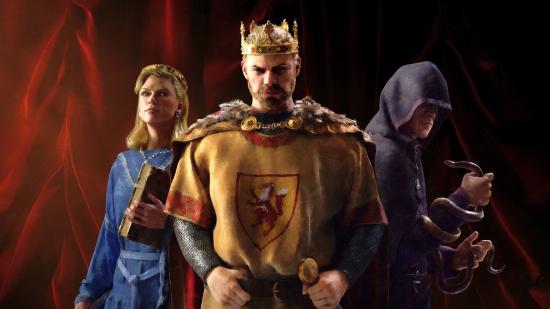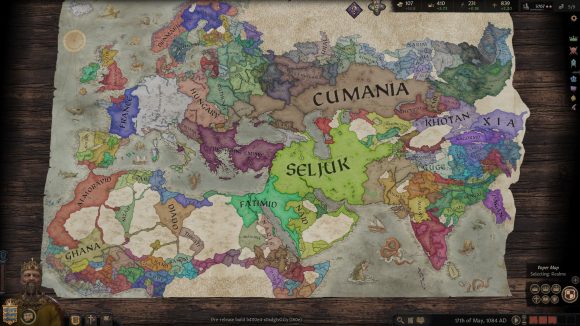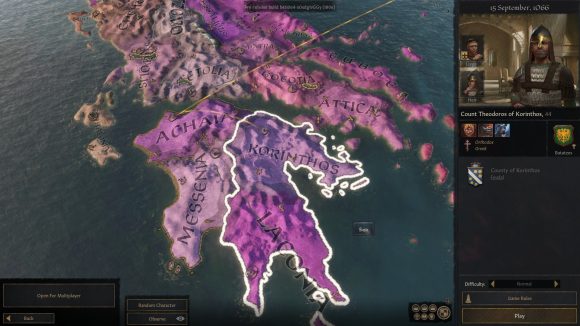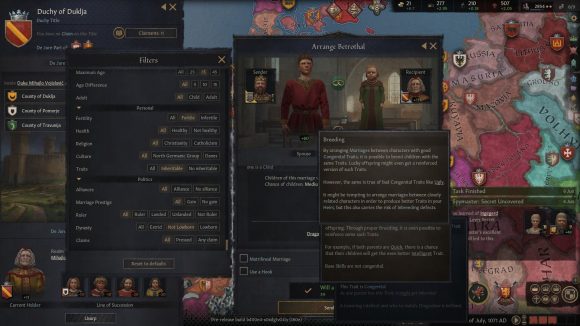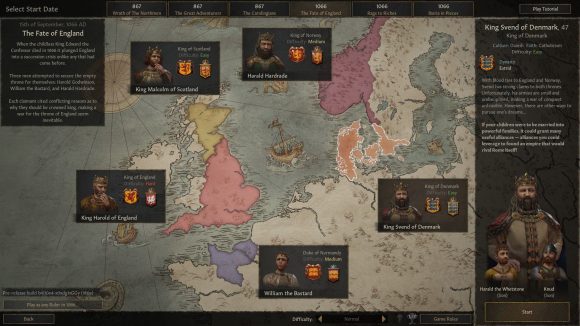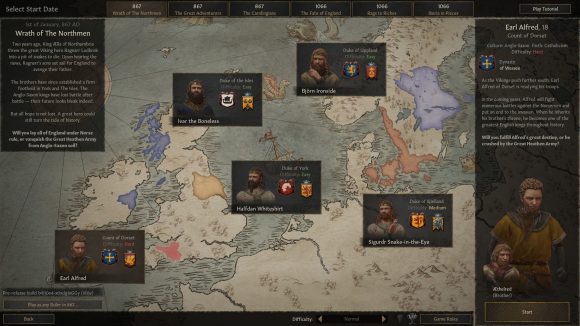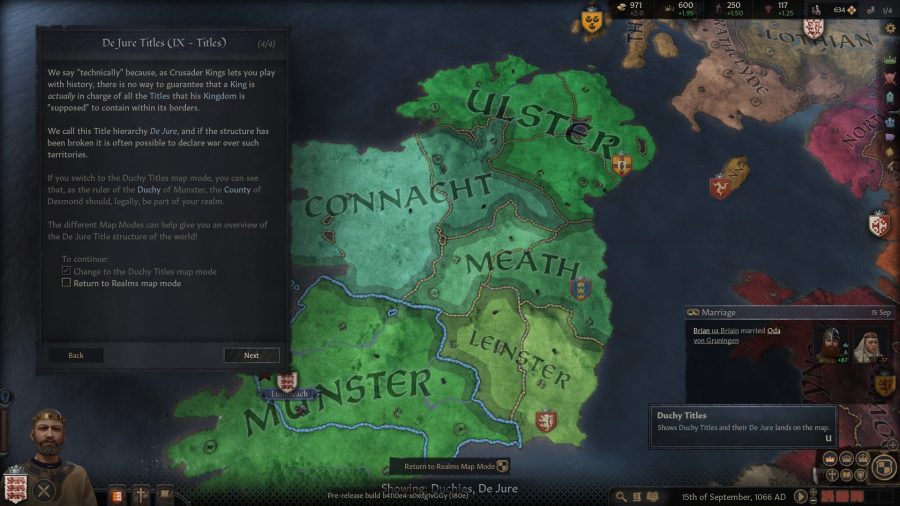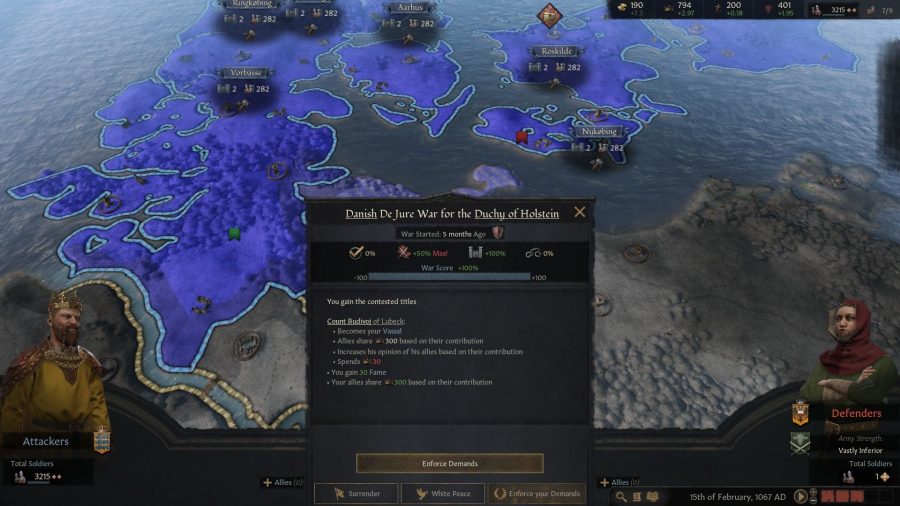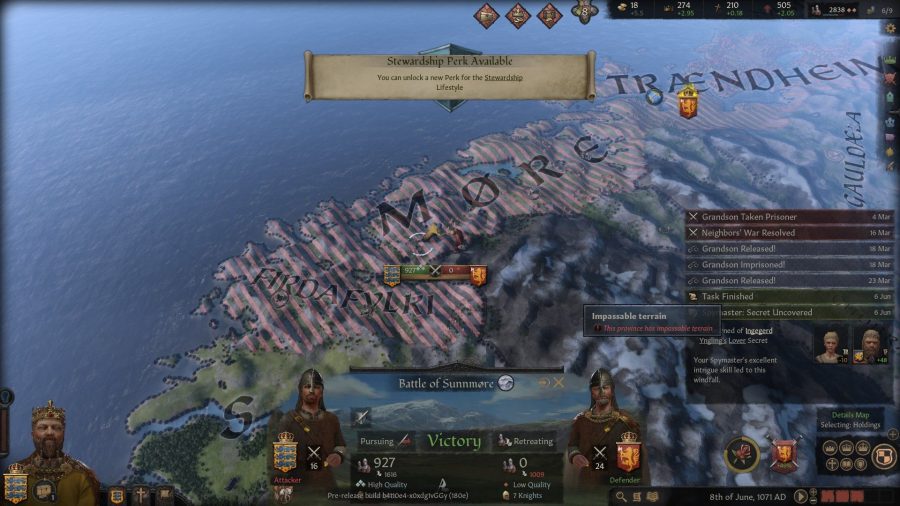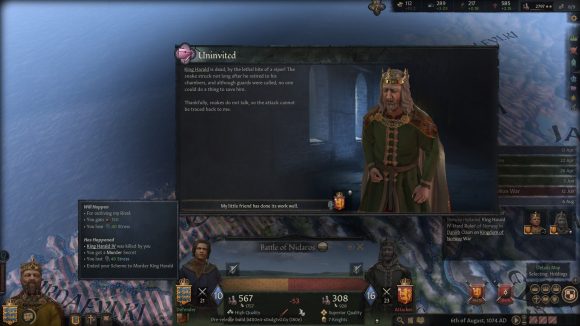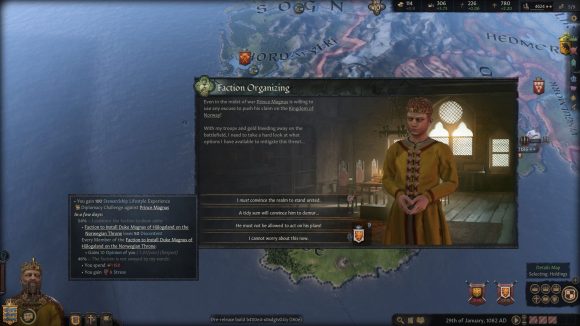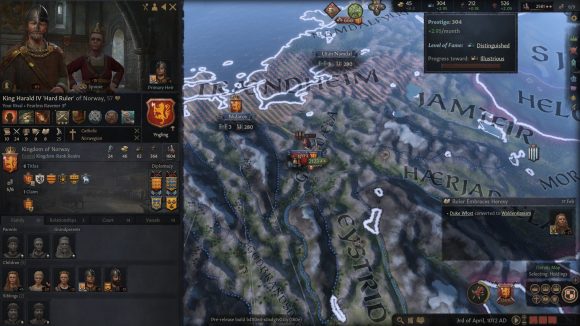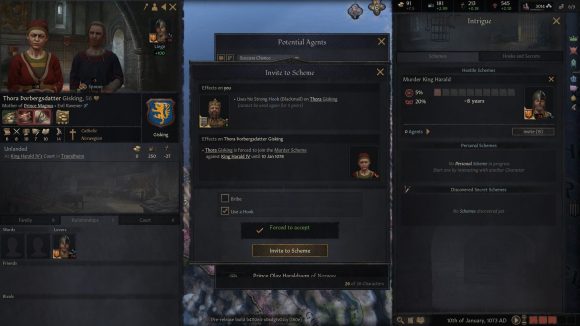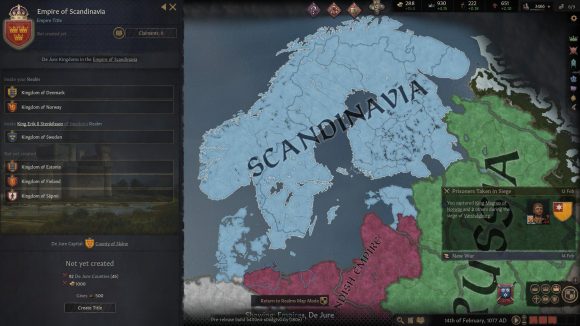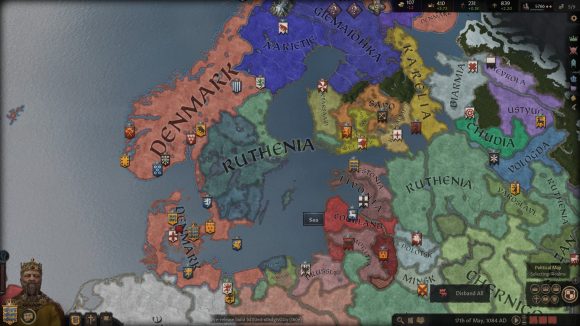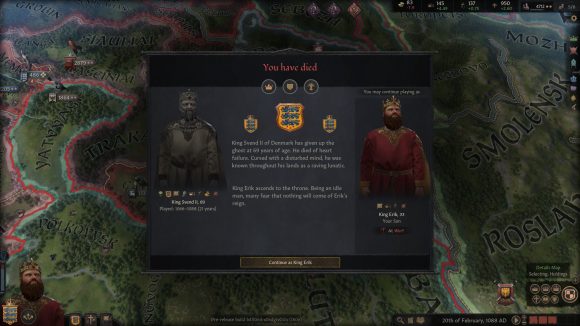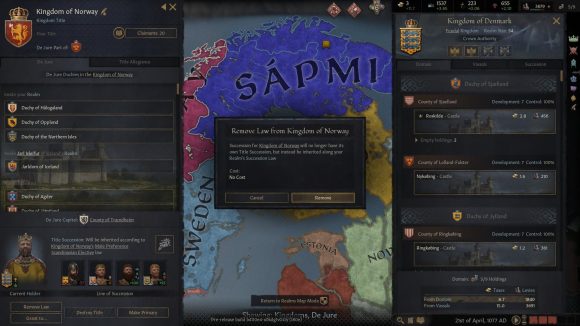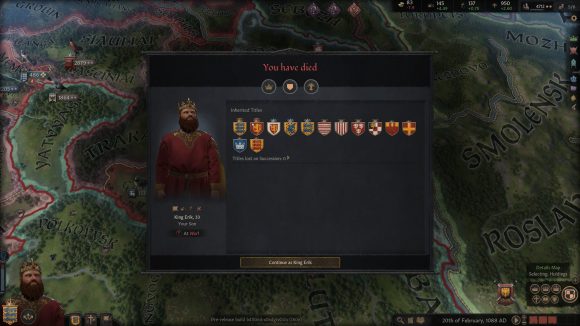It took me about an hour to unpause time on my first game of Crusader Kings III.
I’m pretty sure I had fun, though. I spent all that time acclimatising, you see, and the process of bedding in somewhere new is pleasant – like unpacking your suitcase immediately after arriving at your hotel room, which I never do but whatever. It lends a sense of order to, and thus control over, your environs.
Crusader Kings III’s tutorial – while long and text-heavy – did what its predecessor’s could not, and gave me enough confidence in my grasp of the game’s systems to make some decisions. There are two potential start dates in CK3, and the game suggests 15 characters to play in each (confident players can once again play as literally any ruler on the map, if they wish). After some deliberation – I’m very tempted to fend off the Viking invasion of Britain as Alfred of Wessex in 867, but he’s rated ‘hard’ and I’m not ready for that – I pick King Svend II of Denmark in 1066.
I load into a vast map of Europe and Northern Africa, stretching from Iceland to modern Burma in one direction, and from Africa’s Gold Coast to the Russian region of Transbaikal, or Dauria, in the other. All this territory is depicted on the map and claimed by in-game characters down to the level of a county. Each of those characters have parents, many have children, and there are even some unlanded characters governing cities. In all, developer Paradox tells me there are over 20,000 characters living out their agenda at any one point in the game world.

Hence that hour’s worth of acclimatisation. Thanks to the tutorial, I know the basics of how to play, but I’m burdened with a habitual strategy gamer’s need to understand every variable and make decisions that are close to optimal. This is possible in, say, Civilization or Total War, where there are fewer variables and fewer potential decisions. During my time in CK3, I will grudgingly come to accept that I can’t comprehend let alone influence every single little thing that’s going on in the bubbling cauldron of Medieval Europe. I will miss opportunities to gain advantage, and some of the actions I take may not be the best.
The game’s ‘situations’ tab was partly responsible for my anxiety over these decisions, until I realised it’s not a notification to be acted upon and dismissed as in other strategy games, but rather a constant presence to be reviewed in case one of its situations aligns with an opportunity. It keeps me informed of every child without a spouse or a guardian even if there’s no one suitable to fill the role, every war I could declare even if none are practical, and every title I personally stand to inherit even if from my own vassals.
For instance: what to do with all my kids? Svend’s loins have been pretty active up to now, and if Game of Thrones has taught me anything, it’s that children are a currency to be spent on political alliances and title claims. Hence, a lot of that first hour is spent in menus, shopping for spouses that tick all possible boxes of political, military, and dynastic usefulness, or guardians serving powerful future allies who can also provide effective education.
I marry one child to a Hungarian princess in the vague hope that their children will inherit some claims a few years down the line, send a four-year-old off to be a ward of William the Conqueror (turns out he’s either a rubbish teacher or my kid is an idiot, as he comes back with a rudimentary one-star grasp of the Martial lifestyle), and betroth my most capable son and appointed heir to a genius toddler in the hope that they will spawn an ubermensch for my spirit to inhabit when it passes from King Svend’s body, feeling slightly grubby that it would one day mean I had to write a sentence like that.
At least the hour of inaction is pleasant; as I survey my future dominion, waves crash gently against coastlines, birds chirp, and period-appropriate music based on strings, pipes, and monastic singing produces a thoughtful, serene atmosphere – with just a touch of the maudlin. A minimalist, tasteful UI of cool royal blue tones allows the gorgeous map to take centre stage. This game is just a nice place to be. The much-vaunted 3D character models lend a real sense of personality to the 20,000 players in this drama – and crucially they’ll change over time, my son sprouting a great ruddy beard as he enters manhood, while I as King Svend sprout grey streaks in my hair and lines on my face.
Anyway, the game – much like this preview – is finally ready to start. The situations tab alerts me to a couple of solid claims against minor neighbours who will put up no serious resistance, and I gobble them up like the Medieval megalomaniac I am looking forward to becoming. ‘History will remember you as the first steps my mighty dynasty took to founding the Empire of Scandinavia,’ I imagine myself saying to Duke Whoever (real name: Duke Krutoj of Veletia, but I’ve already decided history shall forget him).
For more evil schemes: See the best strategy games on PC
Later events will chase this shot with a bitter taste of hubris as Duke Whoever, resentful that I am not his de jure liege, starts a populists’ rebellion against me. I eventually sort it out by appointing him my Marshal, which is handy for me as he’s also a badass, but if I want him to pay me the taxes and levies he ought to owe me I need to contrive my way into ruling the kingdom of Pomerania so that he’ll accept my rule.
Obvious claims enforced, I deliberate – in a more efficient, focused manner this time – over my next conquest. I have a strong (or ‘pressed’) claim to the entirety of England, but given that this is 1066 there’s a fair bit of competition over there. One of the contenders is Harald III of Norway, aka ‘Hardrada’, and it so happens that I have an unpressed claim to his homelands. Endless, grinding wars borne of overambition were a big reason why I bounced off of CK2, and I worry that I’m not ready to take on Norway, especially given Harald’s alliance with neighbouring Sweden. But the Swedes also have their hands full, and I figure that a white peace – an end to the war in which we basically call it a draw – would be an acceptable outcome, as it will turn my unpressed claim into a pressed one, meaning my successor can inherit it and try again later.
Besides, it just feels like the right thing to do. I love the sneaky, deliciously Medieval opportunism of invading while Harald is distracted in England, and the historical poetic justice of the manoeuvre: Harald had allied with Svend of Denmark in 1046 against his own nephew, Magnus the Good, only to later betray Svend and raid the Danish coast while claiming his throne, perhaps dreaming of restoring Cnut the Great’s North Sea Empire. Well, screw you, Harald – I’m going to do it.
There are still some things I need to figure out about warfare, like the most efficient way to raise my ‘war score’ (the game’s metric for success in my campaign). I also get a nasty surprise when the big man himself comes home from England and goes around being a giant Viking badass, routing an army twice the size of his own. Again, I wasn’t prepared for how big a difference a decent commander could make.
This sort of thing happens quite a lot – the tutorial is long enough already, and simply can’t explain every nuance of all of CK3’s systems. But that’s ok. What matters is that the rules are consistent, and that I’m able to figure out what happened so I don’t make the same mistake twice. And if any of these surprises feel especially egregious, I think a little save-scumming is justified. Besides, for every one of those nasty surprises, there’s another when a plan comes together.
It’s clear, for instance, that Something Must Be Done about Harald. The tutorial has familiarised me with the basics of CK’s famous skulduggery, and I put my spymaster in Harald’s court, ears to the ground for secrets. I discover he’s having an affair with some courtier, who decides the risk of exposure is such a big deal to her (I doubt Harald would’ve given a shit) that it becomes a ‘strong hook’ – a secret so powerful that she’ll join a murder plot against him to keep it quiet. I engineer a decent chance of success and, rather than dying in battle at Stamford Bridge, Harald Hardrada is assassinated by snakebite while leading an army in Norway. Cue evil laughter.
War score hits 100% and I enforce my demands on Harald’s son, Magnus. He becomes my vassal along with about a dozen other Norwegian dukes and counts, who are all pretty pissed at me, as are many of my own native Danes for having kept their levies raised in an offensive war for so long. Happily, placating them is an equally enjoyable challenge: I get Duke Whoever to enforce order on my own lands, and then lead armies against a peasant rebellion when that doesn’t work. I throw a feast, I send my diplomat to charm Magnus and put him on my council, and then get Duke Whoever to lead armies against a Norwegian coup to restore him to the throne when that doesn’t work (even though his opinion of me has become positive).
It may sound like Operation Placation didn’t really work, but I now understand I was just a bit too slow to act. I’ll do better next time. My final worry is keeping all my newly conquered land within my own dynasty, as Svend is getting on a bit. In particular, the info panel for the Kingdom of Norway shows that someone other than my player heir stands to inherit it, which would mean everything I just conquered will slip from my dynasty’s grasp. I poke around in some more menus and find this is due to the Kingdom’s special elective succession law, which, as its holder, I have the power to revoke. *Steeples fingers.*
After consolidating the land I’ve just conquered into duchies – ransoming captives and selling hooks to raise the necessary funds – I earn the hefty 750 Prestige needed to revoke the succession law. I can now ensure that the new duchies and the Kingdom itself pass to exactly whomever I want, and when King Svend finally dies of heart failure, everything passes to my preferred heir, Erik. And obviously, everyone hates him for holding too many titles and for being too new.
Still, it feels like a big refresh, a cobweb-clearing moment: I have a new, young king with a far more winning personality, I’ve retained all his land, and I now have plenty of time to placate my vassals (again) and pursue more conquest. But I’ve inherited new challenges: I will greatly miss Svend’s expertise in the money-making Stewardship lifestyle, nearby rivals such as the Holy Roman Empire and Ruthenia are growing, and I’m looking short on claims to press. The details of developing such claims are still unclear to me, and it’s hard to pace expansion alongside consolidation. I could definitely do better at understanding and managing certain dangers, but there are also plenty of events that are wholly beyond my control, such as kids who won’t stop disgracing our dynasty by shagging around or ambitious cousins plotting to murder valuable courtiers.
Despite all of that, I’m hooked. So far Crusader Kings III is an authentically tempestuous recreation of Medieval intrigue in which I’ve sometimes struggled to accept my own mortality and vulnerability to events – certainly when compared with other strategy games – but that’s hardly the Medieval mindset, is it? You can kill as well as be killed.
Crusader Kings III is out on September 1. The Steam page is live now.
